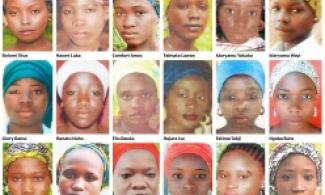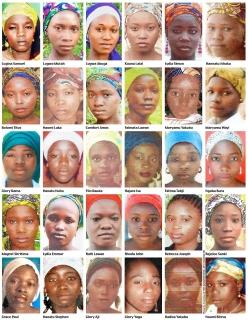
“We are trying to establish if they are bona fide, how useful they are in Boko Haram, have they reached a position of leadership where their absence is of relevance to the operation of Boko Haram?” he said.
President Muhammadu Buhari has promised to grant amnesty to Boko Haram fighters on the condition that they release all the abducted Chibok schoolgirls.

The President, who is on a three-day visit to France, said this during an interview with Agence France Presse on Wednesday.
Buhari told AFP that the Federal Government was talking to Boko Haram’s prisoners and could offer them amnesty if the extremist group hands over more than 200 schoolgirls abducted from their hostel at the Chibok Government Secondary School, Chibok, Borno State on April 14, 2014.
He added that he was confident that conventional attacks by the terrorists would be rooted out by November but cautioned that deadly suicide attacks, some of them waged by children, were likely to continue.
He said, “We are trying to see whether we can negotiate with the Boko Haram prisoners in our custody for the release of the Chibok girls.
“If the Boko Haram leadership eventually agrees to turn over the Chibok girls to us, the complete number, then we may decide to give them (the prisoners) amnesty.”
Buhari, who has promised to stamp out the group’s bloody six-year insurgency, said the government would not release any prisoners unless it was convinced it could “get the girls in reasonably healthy condition.”
But he cautioned that negotiating with Boko Haram militants was fraught with difficulties.
“We are trying to establish if they are bona fide, how useful they are in Boko Haram, have they reached a position of leadership where their absence is of relevance to the operation of Boko Haram?” he said.
Buhari said he was confident that the military would defeat Boko Haram before the end of the year but expressed pessimism over the possibility of stopping the terrorists from attacking ‘soft’ targets.
He added, “The main conventional attacks, where Boko Haram use armoured cars they took from the Nigerian troops, or mounted machine-guns on pick-up vehicles and so on, we believe by the end of the three months, we will see the end of that.
“What may not absolutely stop is the occasional bombings by the use of improvised explosive devices.
“We do not expect a 100 per cent stoppage of the insurgency.”
Meanwhile, the Centre for Crisis Communication, which is acting as a middleman between the Federal Government and Boko Haram, says the terrorists have said they are tired of fighting.
The Executive Secretary for the CCC, Air Commodore Yusuf Anas (retd.), said this in a statement on Wednesday.
Anas, who is a former Director of Public Relations and Information, Nigerian Air Force, said terrorists sent the CCC a message saying they are tired of fighting and willing to end the war.
He noted that none of the suspected Boko Haram elements that spoke with the CCC asked for any form of monetary inducement or compensation as a pre-condition for laying down their arms.
“In fact, many of them said that they were simply tired of fighting and being fugitives in a war that they were deceived into joining,” he said.
Buhari had said on Tuesday that the Federal Government had begun negotiations with members of the Boko Haram sect to secure the release of the Chibok girls.
The President said one of the conditions given by the terrorists was to release one of its members who was developing Improvised Explosives Devices. He, however, said that his government rejected the demand.